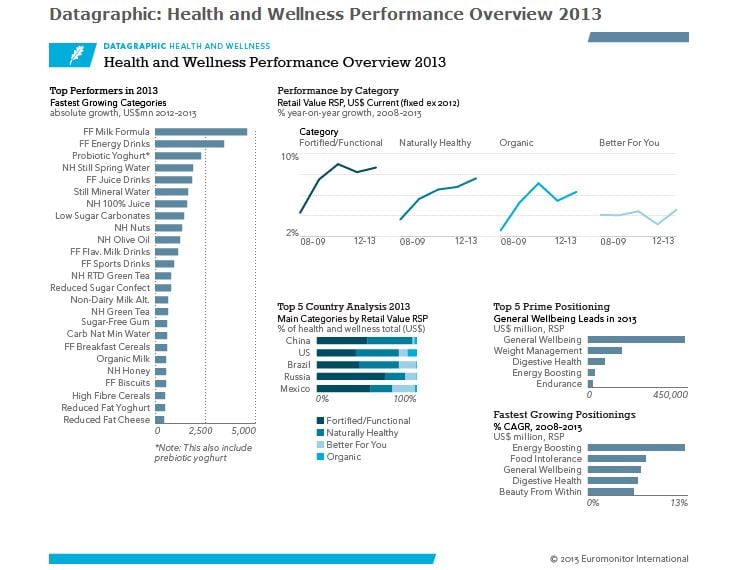Energy drinks were the next best adding about $3.5bn (€2.54bn) for the year, followed by pre- and probiotic yoghurts at about $2.4bn (€1.74bn), and still waters at about $2bn (€1.45bn).
The researcher did not give absolute market size figures – just the gains in a health and wellness category it estimated to have grown $50bn+ (€36.36bn) in 2013.
‘Functional and fortified foods’; ‘organic’ and ‘better-for-you foods’ all increased growth in 2012-2013 after growth slowed in preceding years.
Infant to grow up fast
Analyst Diana Cowland told us infant formula’s rapid expansion was set to continue with growth of 11% CAGR until 2018 being driven by Asia and more particularly, China.
“As consumer education regarding functional ingredients grows, consumers are demanding more added value from the milk formula through the likes of ingredients such as prebiotics and omega-3,” Cowland said.
“It is the rapidly expanding base of middle-class consumers in emerging economies, with high aspirations for their children and a willingness to make sacrifices, which is the prime target audience for products containing ingredients which benefit developing brains.”

She said the rise of Asia was carrying more sluggish European and American markets, but added that growth potential in Africa and the Middle East was vast as incomes rose there.
“However in these regions growth will be driven by volume sales rather than value sales.”
Energy drinks
The energy product sector would also stay strong, with latin America recording the strongest growth at 19% CAGR to 2018.
“Asia Pacific, Latin America and North America will drive value sales and unless regulatory action is enforced, the energy drink bubble will not burst anytime soon,” she observed.
Non-dairy milk alternatives
In smaller categories Cowland picked out non-dairy milk alternatives like rice, oat, hemp and nut milks as star climbers.
“This category is set to be the fastest growing health and wellness packaged food category in 2013. Driven predominantly by the US, interest is rapidly increasing due to the rising prevalence of food intolerances and the health concerns attributed to soy.”
Invested in pre- and probiotics? Probiota 2014 will explore the prebiotic-probiotic scientific frontier, its evolution and commercial application in food, nutraceuticals, pharmaceuticals and cosmetics across the globe.
The 2-day, 2-stream event – formerly Probiotech and Microbiota - will be held in Amsterdam on February 4-5 next year. Will you be joining your peers there?
